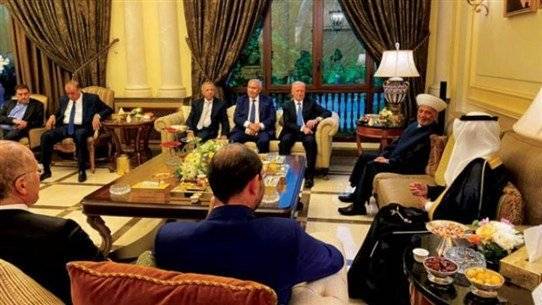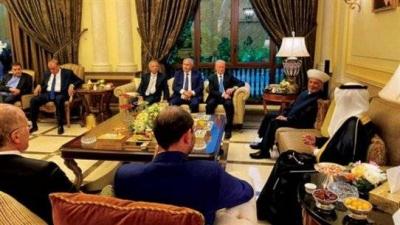The statement issued following the meeting of Sunni MPs, called by the Grand Mufti of the Lebanese Republic Sheikh Abdul Latif Daryan, coincides with the delicate and difficult circumstances Lebanon is experiencing. It cannot be separated from its implications that focused on national constants regarding the ongoing preparations to complete the presidential election on schedule, electing a new President to succeed the current Michel Aoun, with only 35 days left of his presidency. Notably, the statement concentrated on the qualifications that should be possessed by his successor without discussing the names of potential candidates. This sentiment also extended, according to several MPs who participated in the meeting, to the atmosphere that surrounded their hosting by the Saudi Ambassador to Lebanon, Walid Bukhari, at a dinner he hosted at his residence in Yarze.
According to these MPs, the constants emphasized in the statement aligned largely with the speech delivered by Mufti Daryan at the opening of the Sunni parliamentary meeting, which was attended by 24 MPs out of a total of 27 Sunni MPs in Parliament, with MPs Osama Saad, Halima Al-Qaqour, and Ibrahim Munimena apologizing for their absence. It was notable that Mufti Daryan's speech and the statement issued from the MPs' meeting contained several common elements with the statement released by the foreign ministers of the United States, France, and Saudi Arabia on the sidelines of their participation in the UN General Assembly in New York, which outlined a road map, in their view, required for Lebanon to transition from crisis to relief, starting with completing the presidential election on time.
These MPs revealed that 21 MPs who participated in the meeting supported the statement, while MPs Jihad Al-Samad, Yanal Salih, and Melham Al-Hujayri expressed their reservations. The latter two belong to the "Loyalty to the Resistance" bloc led by Hezbollah, and they said their reservations were in form, claiming that the initial draft of the statement had not been distributed to them before the meeting for study and to provide any comments they might have.
They confirmed that Al-Samad had prepared a memo and presented it to Mufti Daryan, which he recited at the start of the meeting. Other MPs contributed their opinions to the final draft of the statement that was distributed to them, and MP Wadih Al-Sadiq from the “Change Forces” bloc criticized the campaigns of treason and intimidation that targeted his colleagues Munimena and Al-Qaqour via social media due to their apologies for not participating in the meeting.
MPs questioned whether Al-Samad's reservations were merely in form or if he would later develop his position towards reservations on some contents of the statement. They noted that this question extends to the reservations expressed by Hezbollah MPs Salih and Al-Hujayri, which can only be understood if the party openly expresses its opinion on the statement's content, as it views its implications from a regional angle due to calculations that go beyond domestic issues.
On the other hand, the "Development and Liberation" bloc, led by Nabih Berri, was represented at the meeting by MP Qassem Hashem, while the "Islamic Charitable Projects Association" bloc (Ahbash) was represented by its MPs, Adnan Traboulsi and Taha Naji. The "Islamic Group" was represented by MP Imad Al-Hout, who apologized for not attending the meeting called by the Saudi ambassador for personal reasons.
It turned out that MPs Hashem, Traboulsi, Naji, and Al-Hout did not oppose the statement, unlike their colleagues Al-Samad and the Hezbollah MPs, even though they operate within the same political sphere and maintain a firm alliance. Berri expressed his satisfaction with the speech delivered by Mufti Daryan, stating to “Asharq Al-Awsat”: “I listened to Mufti Daryan’s speech, and it was more than good and unifying; what matters is completing the presidential election on schedule.” He confirmed the necessity of forming a government, but emphasized that electing a new President is more crucial to prevent benefiting from the presidential vacuum.
Berri noted his preference for the government to be formed sooner rather than later, but he did not want to preempt the results of the upcoming meeting between Aoun and Prime Minister-designate Najib Mikati upon his return from New York. "We have to wait to see if the government will come to light, or if its formation will stumble at the last moment. However, optimism remains because its formation would defeat arguments suggesting that the country will enter constitutional chaos. I don’t think anyone has an interest in leading the country into a place we do not want amid these difficult circumstances."
Regarding the dialogue meeting between the Sunni MPs and Ambassador Bukhari, who hosted them at his table in the presence of Mufti Daryan, “Asharq Al-Awsat” learned from parliamentary sources that it provided an opportunity for the MPs to express their concerns and worries regarding the catastrophic crises that continue to besiege their country, as stated by MP Bilal Abdallah from the "Democratic Gathering". They focused on major national constants and the need for collective efforts at all levels to extricate the Lebanese people from their crises and reassure them about their future, in addition to fortifying the Taif Agreement, which is subject to violations aimed at overturning it, sometimes through amending the constitution it produced and other times by replacing it with a new system.
The parliamentary sources revealed that Bukhari listened to the MPs' concerns and fears and responded to some individuals’ criticisms of Saudi Arabia, prompting him to provide a detailed explanation of Lebanese-Saudi relations. He stressed that the kingdom has never wavered in its support for Lebanon and stood by it during the most challenging circumstances it has faced, provided that Lebanon does not abandon itself. “We in the kingdom will not spare any effort to provide assistance to the Lebanese people, but Lebanon must undertake the necessary reforms to overcome its crises and help itself first so that we can offer assistance. This is what the international community demands and insists upon."
In this context, parliamentary sources quoted Ambassador Bukhari as saying that the kingdom had sent a mission of specialists to Lebanon in preparation for a meeting of the Lebanese-Saudi joint committee in Riyadh, with an agenda that included signing 22 agreements aimed not only at rescuing Lebanon but also putting it on the track towards becoming a developed nation, which was planned back in 2016. However, procrastination and delay prevented these agreements from being adequately prepared for signing between the two countries.
Bukhari addressed the Saudi position regarding the internal situation in Lebanon, relaying the sources' comments that Saudi Arabia operates under a consistent strategy in dealing with countries, based on not interfering in the internal affairs of any country, “which primarily applies to our policy towards Lebanon. What concerns us is its stability, security, and sovereignty; we do not interfere in details and hope that a new President will be elected on schedule.”
He considered that electing a president is an internal matter and emphasized the necessity of respecting constitutional deadlines and that the new president should unify the Lebanese and possess the qualifications to facilitate cooperation to rescue his country. He stated, “Lebanon is among the dear brotherly countries to us, and we are working to secure an Arab and international umbrella to provide protection for it, serving as a political safety network that paves the way for it to emerge from its crises.”
While Bukhari stressed the importance of Lebanon adhering to a policy of disassociation and neutralizing itself from the axes of conflict and avoiding interference in the domestic affairs of brotherly countries, he also highlighted that “Lebanon means a lot to us, and we will not leave it alone as long as it initiates efforts to assist itself. This is what we wish for this brotherly country, hoping that the president will be elected on time. We do not have any candidate, and we leave the final say to the Lebanese parliament in electing a unifying president, thus allowing Lebanon to begin paving its path towards restoring its role on both the Arab and international levels.”




